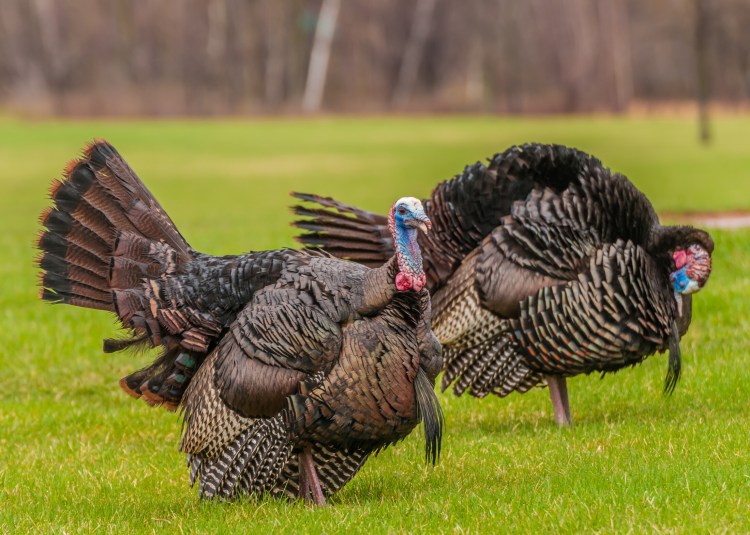I woke instinctively at 3:30 a.m., as I had every morning for the past week, without the assistance of an alarm, and was greeted with the expected raindrops hammering on the roof. That provided sufficient excuse for me to roll over and return to sleep rather than rise and face yet another day of chasing the wily wild turkey. This time, thankfully, the weather man got it right.
We all complain about the weather and nearly as often the folks who try to predict it, but the process has become a critical part of our lives, partly because the prognosticators have become so prolific. If you don’t believe me, watch the morning news broadcast from any of Maine’s three major networks. Sportscasters no longer exist and sports reporting is all but eliminated. Meanwhile, weather reports and forecasts from one and often several different meteorologists dominate the broadcast to such an extent, they might as well call it the morning weather, with a little news.
While we perpetually bash these folks, you have to admit they do a pretty darn good job of portending precipitation and forecasting fine weather which is not easy because the process is influenced by the randomness of non-linear dynamics.
Pinball provides a good analogy and example of the effect. You sling a steel ball bearing into an array of bumpers and other objects spaced around the face of a tilted board. You know that ball will eventually end up at the bottom, but the course it will take will vary and is influenced by every obstacle it encounters along its way down, depending on the speed and angle at which it strikes those obstacles.
Much the same applies to weather. Meteorologists can see an approaching storm front, but where, when and if it arrives can vary considerably with influences encountered along the way. It may stall against an occluding front. A southerly flow could push it farther north, or strong westerlies might push it out to sea. A high pressure area might literally take the wind out of it. It’s tough to say, so to hedge their bets, the weather folk have created two different “models” as to what might happen.
What’s all that have to do with turkey hunting? For starters, weather can be a strong influence on turkey behavior and therefore, how to go about hunting them. On rainy days, they typically linger longer on the roost. Once on the ground, they tend to be less interested in breeding and more interested in feeding, and spend more time in open areas like pastures and fields. Camping out in the comfort of a ground blind on a field edge is a far more productive tactic on rainy days than is running and gunning.
More importantly, turkey behavior is subject to the same chaos of nonlinear dynamics as is the weather. As a guide, a turkey hunting author and a seminar speaker, I’m often asked about predicting turkey behavior, and my answers seldom satisfy the inquirer. That’s because we all want turkeys to follow predictable patterns, and sometimes they do. But I would never bet money on it.
Turkeys are a most adaptable species with highly developed survival skills, but they’re not all that bright. You may watch a flock fly from the roost, land in a field and march down to a silage pile several mornings in a row, and confidently predict they’ll do the same thing the following day. So you arrive well before dawn the following morning, set up your ambush location and await their anticipated arrival.
There’s a saying in turkey hunting that “roosted ain’t roasted.” The birds launch from their limbs and land in the field just as they have before, and start heading your way. Partway along their course, a distant dog barks and the lead turkey turns its head in that direction. Three seconds later, that bird has forgotten why it’s looking that way, but because it is, the bird turns and walks in the direction of the dog, taking the whole flock with her, and away from you. Nonlinear dynamics at its best.
And that’s part of what makes turkey hunting so enjoyable. If we knew what they were going to do every time we go after them, the sport would quickly lose its luster. It’s the randomness and unpredictability that makes it more challenging, and the failures and lessons learned from them that makes the rare successes so much more valuable. As for the forecast, the birds are still out there so you can still hunt them, weather or not.
Bob Humphrey is a freelance writer and registered Maine guide who lives in Pownal. He can be reached at: bhunt@maine.rr.com
Send questions/comments to the editors.



Success. Please wait for the page to reload. If the page does not reload within 5 seconds, please refresh the page.
Enter your email and password to access comments.
Hi, to comment on stories you must . This profile is in addition to your subscription and website login.
Already have a commenting profile? .
Invalid username/password.
Please check your email to confirm and complete your registration.
Only subscribers are eligible to post comments. Please subscribe or login first for digital access. Here’s why.
Use the form below to reset your password. When you've submitted your account email, we will send an email with a reset code.